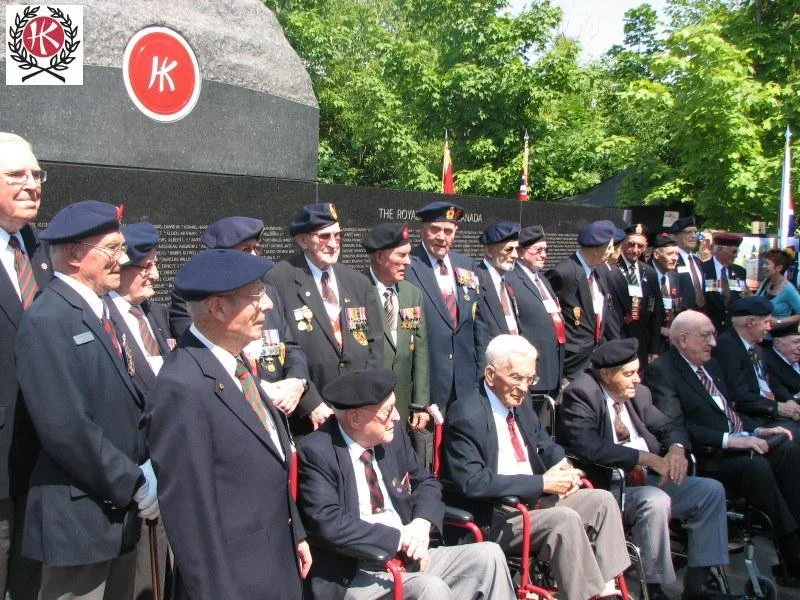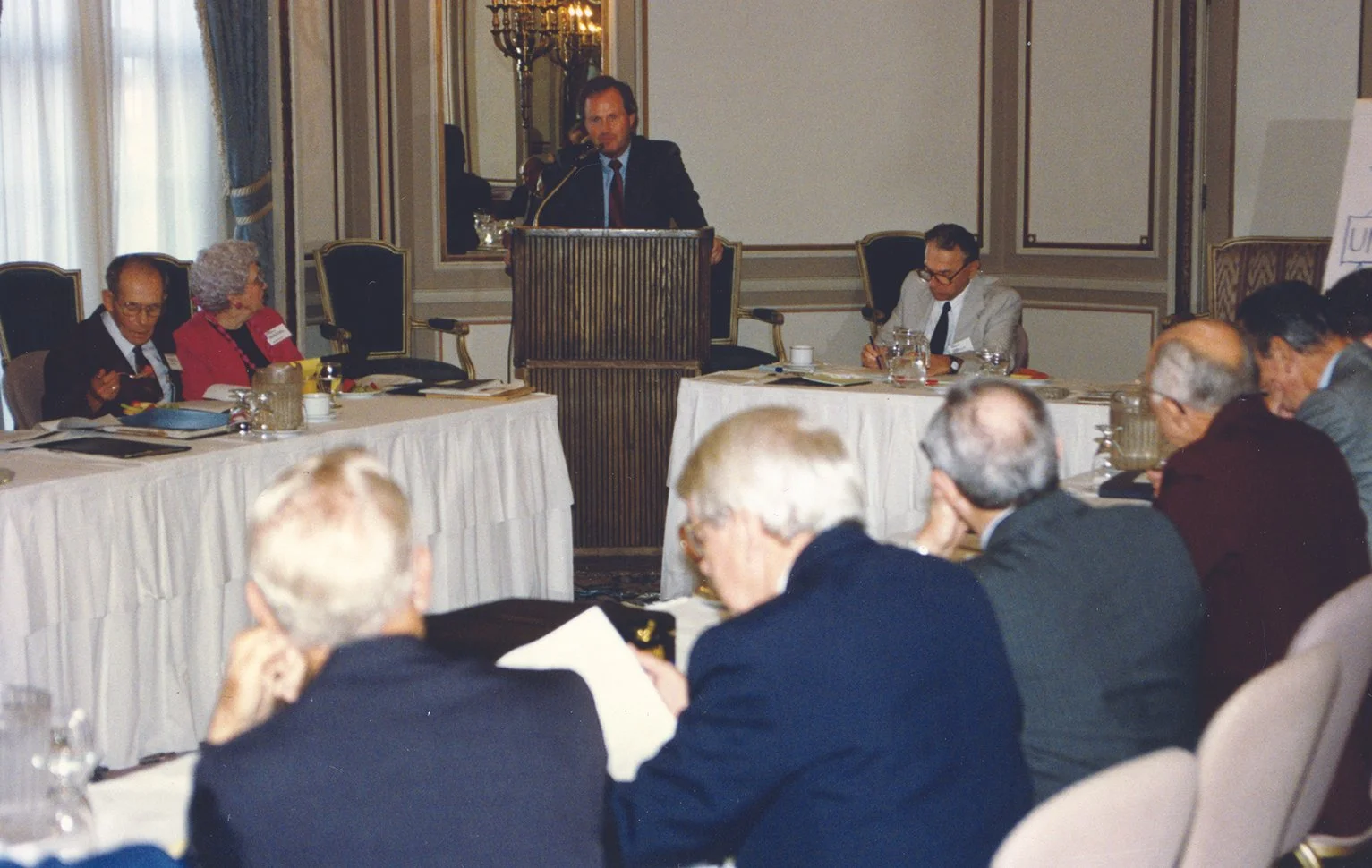Hong Kong veterans at the memorial wall unveiling in 2009. Photo courtesy of the Hong Kong Veterans Commemorative Association
By The War Amps
This year, the 80th anniversary of Victory over Japan (VJ) Day will bring together Canadians to honour the sacrifices of Canada’s Hong Kong veterans and the Canadian soldiers who died in battle or as prisoners of war (PoWs).
August 15, 1945, marked the end of the war in the Pacific and the end of the Second World War. According to The Canadian Encyclopedia, of the 1,975 Canadians sent to Hong Kong, 290 were killed and 493 were wounded during the Battle of Hong Kong and its immediate aftermath. Another 264 Canadians died as PoWs, while 1,418 survivors returned to Canada. As survivors, these soldiers were confronted with the lasting effects and disabilities resulting from the 44 months of forced labour, torture and starvation inflicted by their Japanese captors.
“The Hong Kong veterans really had to carry the worst part of the war for a long time,” says Derrill Henderson, principal founder and first president of the Hong Kong Veterans Commemorative Association (HKVCA). The HKVCA, formerly the Hong Kong Veterans Association, was formed in 1993 by the sons and daughters of members of the “C” Force, the Canadian military contingent that faced impossible odds in the Battle of Hong Kong.
As the son of Hong Kong veteran Stewart Henderson, and with a godfather and four other close relatives who were members of the “C” Force, the younger Henderson has made it his mission to ensure the Far East veterans and soldiers who were killed in the defence of Hong Kong are remembered. This is especially important to him now as there are no longer any surviving Hong Kong veterans.
“My father never talked about what went on. Only after he died did I hear stories from other veterans – things that astounded me,” Henderson says. “We take our losses very hard, as much as we celebrate our wins. The losses, they really stick with you. When I think of the Hong Kong veterans, that’s one thing that always comes to mind. They didn’t really want to surrender, but they had to. They didn’t feel good about it. I think that’s probably why they were not very open.”
While his father did not speak of the war much, Henderson remembers the afflictions his father dealt with every day. Like many of the Hong Kong veterans, the elder Henderson lived with the enduring trauma of his time as a PoW and eventually suffered vision loss among other health complications.
“My dad’s stomach had been bleeding, so they had to cut a portion out. He could not eat a full meal for the rest of his life. At restaurants, he’d actually apologize for not being able to eat all of what was brought to him,” Henderson says.
Upon their return to Canada, the Hong Kong veterans underwent many years during which their disabilities were either undetected or ignored by Department of Veterans Affairs officials.
In 1971, after exhaustive studies, the Far East PoWs were granted a basic 50 per cent pension for undetermined disabilities and were able to claim a supplementary pension on an individual basis. A report commissioned by The War Amps and conducted by the late Dr. Gustave Gingras identified pre-aging and some 19 other medical conditions not found among Canadian men of the same age group as the PoWs.
“Avitaminosis” was adopted as an umbrella diagnosis by the Department of Veterans Affairs in the mid-1970s to encompass the multitude of health conditions these Canadian PoWs had. It did not nearly describe the full extent of the pensioned disabilities, both physical and mental, that they endured.
War Amps executives meet with Hong Kong veterans. The Association went before the UN Human Rights Committee to seek compensation for the atrocities the PoW survivors endured under the Japanese government during the Second World War.
For many years after the Second World War, the Hong Kong veterans, in conjunction with The War Amps, pursued financial compensation and an appropriate apology from the Japanese for their abuse and human rights violations inflicted on the Far East PoWs. In 1987, led by then-CEO Cliff Chadderton and then-Association Solicitor Brian Forbes, The War Amps began an 11-year battle for compensation for Canada’s Hong Kong veterans, exploring several avenues as the Japanese government pointed to the 1952 peace treaty between Canada and Japan to evade the request.
Having sought and obtained non-governmental organization (NGO) status, The War Amps brought the claim before the Human Rights Commission of the UN. A sub-commission studied the claim, which was opposed by the Japanese government. While the sub-commission found there were grave breaches of the Geneva Convention committed by the Japanese, it concluded that the compensation issue was out of its jurisdiction. The War Amps appealed, bringing a petition before the Human Rights Committee (another agency of the Human Rights Commission) to seek compensation for the Hong Kong veterans from the Government of Canada.
The strategy was to trigger an “organization of shame” by exposing the failure of the Japanese and Canadian governments to acknowledge the serious breaches of the Geneva Convention and the maltreatment, torture and gross violations of human rights suffered by Hong Kong veterans. The War Amps argued Canada was in violation of the International Covenant by failing to protect the rights of the PoWs, particularly regarding the claim for compensation for forced labour. “Many PoWs died in the Japanese camps and the greater majority suffered severe disabilities that impacted their entire lives,” Forbes said at the time.
The War Amps also argued that the Canadian government violated international law by failing to protect the interests of the PoWs and was neglectful in its refusal to support the claim against the Japanese government. Consistent with the Japanese government, the Canadian government maintained the dispute was settled by the 1952 peace treaty. The UN committee ultimately ruled it could not act on the claim because all possible domestic solutions had not been explored.
Accordingly, The War Amps asked the Canadian government to reconsider the matter and successfully advocated for a hearing before a parliamentary committee. This resulted in the foreign affairs committee passing a unanimous resolution in December 1997 requesting that the government pay the claim and seek reimbursement from Japan.
On December 11, 1998, the Canadian government paid the claim on a humanitarian basis – $24,000 to each surviving Hong Kong veteran or their widow, an amount equal to a mere $1.50 a day for their time in imprisonment. Only about 350 veterans and 500 widows were alive at the time to receive this compensation.
In 2011, with fewer than 60 surviving PoWs (the youngest being 89 years old), the Japanese government issued an apology to the Hong Kong veterans. The apology was accepted by the Hong Kong veterans on behalf of all Canadian military personnel who were PoWs in the Far East during the Second World War.
In recent years, The War Amps has continued its longstanding commitment to support this exceptional group of veterans, even after death. This includes by advocating for the full entitlement of funeral and burial grants as a “matter of right,” resulting in successful applications on behalf of veterans’ families to the Last Post Fund financed by Veterans Affairs Canada. The Association has also shared the story of the Hong Kong veterans with its documentaries, including the internationally award-winning film Canada’s Hong Kong Veterans: The Compensation Story.
Now, as we commemorate VJ-Day, we must continue to remember the “C” Force and the incredible fortitude of our Hong Kong veterans, both in the Far East as they fought for peace and back at home as they fought for the recognition they deserved.
For more information about Hong Kong veterans history and commemoration, please visit the Hong Kong Veterans Commemorative Association’s website at hkvca.ca.



